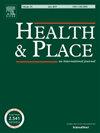“It's not something that can wait”: Defining and promoting gender-inclusive standards for WaSH access for Californians without housing
IF 4.1
2区 医学
Q1 PUBLIC, ENVIRONMENTAL & OCCUPATIONAL HEALTH
引用次数: 0
Abstract
This paper stems from a first known attempt to specify basic standards of care for water, sanitation, and hygiene resources (“WaSH”) for people who lack permanent, stable housing. The project's scope was the U.S. state of California, which is home to half of all people in the U.S. who are living outdoors without housing. Recommendations presented here focus on: 1) defining and specifying gender-inclusive minimum standards for WaSH access and 2) identifying effective ways to promote the urgent importance of WaSH access within a current social-political context that is increasingly hostile toward unhoused people across the United States and in California specifically.
“这不是可以等待的事情”:为没有住房的加州人制定和促进性别包容性标准
本文源于已知的第一次尝试,即为缺乏永久、稳定住房的人规定水、环境卫生和个人卫生资源(“WaSH”)的基本护理标准。该项目的范围是美国加利福尼亚州,那里居住着美国一半的户外无房人口。这里提出的建议侧重于:1)定义和具体规定获得WaSH的性别包容性最低标准;2)在当前社会政治背景下,确定有效的方法来促进WaSH获得的紧迫性,当前社会政治背景下,美国各地(特别是加利福尼亚州)对无家可归者的敌意日益增加。
本文章由计算机程序翻译,如有差异,请以英文原文为准。
求助全文
约1分钟内获得全文
求助全文
来源期刊

Health & Place
PUBLIC, ENVIRONMENTAL & OCCUPATIONAL HEALTH-
CiteScore
7.70
自引率
6.20%
发文量
176
审稿时长
29 days
期刊介绍:
he journal is an interdisciplinary journal dedicated to the study of all aspects of health and health care in which place or location matters.
 求助内容:
求助内容: 应助结果提醒方式:
应助结果提醒方式:


